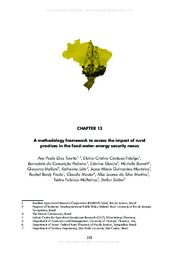A methodology framework to access the impact of rural practices in the food-water-energy security nexus.
A methodology framework to access the impact of rural practices in the food-water-energy security nexus.
Author(s): TURETTA, A. P. D.; FIDALGO, E. C. C.; PEDREIRA, B. da C. C. G.; GARCIA, E.; BONATTI, M.; MELLONI, G.; LÖHR, K.; MONTEIRO, J. M. G.; PRADO, R. B.; MOSTER, C.; MARTINS, A. L. da S.; MALHEIROS, T. F.; SIEBER, S.
Summary: Considering all the scenarios about population growth and the increasing demand for food, water and energy, we highlight the potential of MFA to provide a range of benefits - beyond its primary function that is to produce food - through the promotion of conservationist practices in rural landscapes. We presented a feasible methodology framework to evaluate the impact of rural practices on the FWE security nexus in the Atlantic Forest biome. The basis of this methodology is the use of secondary data and a participatory approach. Thus, we ensure a bottom-up approach, promoting the stakeholder engagement and a low cost, promoting its applicability.
Publication year: 2022
Types of publication: Book sections
Unit: Embrapa Soils
Keywords: Agricultura, Agriculture, Alimento, Desenvolvimento Sustentável, Energia, Energy, Energy resources, Food security, Foods, Impact, Impacto, Natural resources, Práticas rurais, Recurso Energético, Recurso Hídrico, Recurso Natural, Rural practices, Segurança Alimentar, Sustainability, Sustainable development, Sustentabilidade, Water, Water resources, Água
Observation
Some of Embrapa's publications are published as ePub files. To read them, use or download one of the following free software options to your computer or mobile device. Android: Google Play Books; IOS: iBooks; Windows and Linux: Calibre.
Access other publications
Access the Agricultural Research Database (BDPA) to consult Embrapa's full library collection and records.
Visit Embrapa Bookstore to purchase books and other publications sold by Embrapa.

